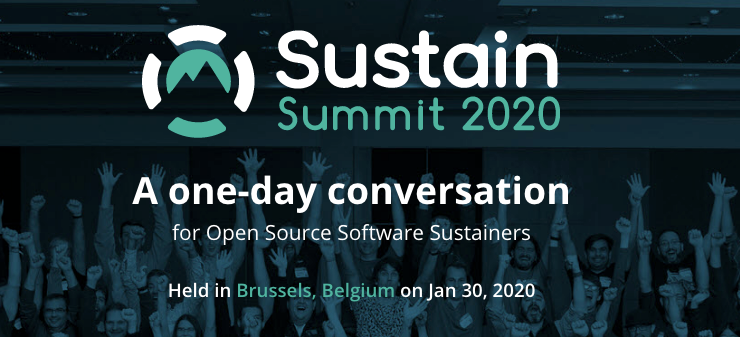2019 in Review and 2020 Goals

The year 2019 was a good one for Open Collective in many ways, and the challenges ahead are making the team more focused and stronger together.

TL;DR:
- Our income grew 2.4x from $84k to $204k in 2019.
- We have +16 months of runway ($825k in the bank, avg. burn rate of ~$50k).
- Total financial contributions went from $1.6M to $4M+.
- The largest movement for the climate, FridaysForFuture, is now on Open Collective, along with many Extinction Rebellion groups as well.
- Open Source is still the largest vertical, with a lot of growth still ahead (e.g. Google went from donating $60k in 2018 to $160k in 2019 to $390k already procured for 2020).
- Xavier is moving to the Open Collective Foundation to focus on the Climate Emergency.
- We're evolving our pricing model to embrace more payment methods for fiscal hosts.
2019 in Review
In 2019, we more than doubled our income from $84k to $204k and the total funds raised via Open Collective grew from $1.6M to +$4M. We have $825k in the bank and an avg. burn rate of $50k. This gives us 16 months of runway.
When we started 2019, we set out to experiment with building a "Github for communities"—we wanted to provide a platform to go beyond fundraising and provide a new, global, open, and transparent organizational structure where millions of people can coordinate.
Open Collective was born as a mission driven, strong-values company, and that makes us who we are. It is the type of company we all want to wake up in the morning and build. We want to be sustainable while doing what we think is right for our community, society, and the planet. Sometimes, this means that we will go out on a limb to impact issues we care deeply about.
In 2019 we did that for the climate fight and social movements. Xavier took a step back from his role as engineering lead and focused on a business development role for this vertical. After many months embedded in these communities, his experience led us to believe that it will take more time than we have to serve them well and make a sustainable business out of it.
While we still believe these solutions are necessary, we learned that unless it becomes the focus of the entire team we won't be able to deliver anything meaningful, and before we can make this the focus we first need to reach sustainability. This year brought the most valuable lesson for any team, in my view: split focus can kill you. It is always tempting to experiment with ideas we believe strongly in, but splitting our small team’s focus to serve communities with significantly different needs, while trying to build a sustainable business, is a messy and potentially fatal move.
While the Climate Emergency Collectives are a growing community on our platform (eg. FridaysForFuture and ExtinctionRebellion), it hasn’t grown enough for us to justify spending more resources to build specific features for them.
Xavier is very passionate about this fight and he has involved himself deeply. He is convinced that we must act now to provide these groups with the tech they need to organize. It needs to be decentralized, with ownership in their hands.
While all of us at Open Collective are supportive of this vision, it’s not realistic to pull resources from revenue generating users in other verticals, such as open source and meetup networks, to build this new tech. Therefore, Xavier will be taking a step back from Open Collective Inc to focus on the Open Collective Foundation, to provide a community version of the platform (think the equivalent of Wordpress or Drupal). He will be fundraising separately for this non-profit endeavour.
Looking at 2020
As we look at our numbers and strategy for 2020, we have decided to go back to our original mission:
Open Collective is an open finances platform that helps communities raise funds in full transparency, without needing their own legal entity.
We are re-aligning our focus to those groups that have been consistently growing, open source projects and fiscal hosts.
What this means for our business model:
During 2019, we noticed a trend that has continued to consolidate: groups are using Open Collective to manage funds not raising through our platform (i.e. via credit card payments on our website). They are adding budget received elsewhere and are using our open finances tool for transparency and reducing admin overhead.
In 2019, of the ~$8M managed on Open Collective close to 50% was added manually (indicating the funds were collected using another platform or directly sent to the host's bank account). The key here is that, right now, we only take a fee from the money raised through us and therefore we are adding a lot of value that we are not being rewarded for.
To address this, we are implementing a new paid plan model for those who want to use Open Collective for managing externally raised funds. We are aligning our interests with the interests of a growing number of users, so we can justify spending more resources on serving them. This model also supports our strategy of focusing back on our original mission.
The Open Source Community:
Open source is still by far our largest vertical. From the ~$4M raised through Open Collective in 2019, +$3.6M was for the open source. We decided in the past not to make this our single focus, for fear of being trapped in a local maximum. However, we continue to see growth in this space and we are continuing to focus efforts on scaling it. As an example, Google went from contributing $60k in 2018, to $160k in 2019, to $390k already procured for 2020. Corporate investment in open source is growing and it’s becoming the new normal. This trend will consolidate in 2020 and Open Collective is uniquely positioned to support it.
For open source, 2020 will be about partnerships
GitHub has launched a beta program enabling funding projects (not just individual maintainers as their previously released Sponsors program was focused on). To participate, they require projects to have a corporate bank account to receive funds. If they don’t, they are directed to information about Open Collective (and other foundations) to find a fiscal sponsor. This represents a huge opportunity for Open Source Collective, and we are working closely with Github on it because together we can provide critical solutions that benefit projects, Github, and OSC alike. The next steps will deepen this integration, enabling new groups to create a Collective through GitHub with a seamless onboarding flow.
Open Source Collective has grown its team with a business development hire. OSC is taking over biz dev for Back your Stack and is laying out a strategy to implement FOSS Contributor Funds inside companies.
FOSS Contributor Funds is an initiative started by Indeed that encourages companies to allocate a yearly budget to open source projects, engaging their engineering teams in deciding which projects to support (read more). OSC is developing services around this initiative, from low-touch practical solutions around how to distribute funds to projects, to high-touch customized recommendations and open source support consulting packages.
Sustain Summit is coming up in Brussels at the end of January, which we're hosting for the third year in a row.

Product
Since September 2019, we’ve been working on features that support our re-focused strategy.
- New Collective Page: better optimized for financial contributions and for enabling projects to connect with backers / sponsors / their larger community.
- New Expense Flow: revamped for better management of funds, optimized for Fiscal Host admins and ease of use.
- New Homepage: Refined our message for community leaders, we simplified it and launched a new style, more organic and inclusive.
- Pricing: Paid plan for better management of other payment methods and manually added funds.
- Create Collective Flow: optimized onboarding path, for creating a Collective with minimal hassle. Ease of use, lowering of entry barriers, clarity of options.
Coming up soon:
- Host Dashboard: Better tooling for Fiscal Hosts.
- GitHub Integration: Automating funds flowing to Open Collective via Github Sponsors for Organizations.
- Payment Options: Improving payment options for receiving funds (SEPA / PayPal / better credit card update handling) and paying out expenses (upgrade of PayPal API).
We will be defining further projects for the upcoming quarter at our team retreat in Brussels at the end of January.
Team
We hired a new senior engineer and a mid-level engineer. Leonardo and Kate are starting in January as part of the engineering team led by François.
Being remote requires that we are extra conscious about context and transparency. We have built a transparent tool for setting engineering salaries that accounts for cities and level. We also put together the Open Collective Way, which outlines our values, expectations and processes.
Xavier will be transitioning out of the full time team to focus on the Open Collective Foundation.
Alanna is going on parental leave, and we are growing the roles of Alyssa and Alina in her absence. Anna is also on board part time focusing on documentation.
The design team operating out of Guadalajara is working very well. This distributed yet co-located model is increasingly interesting to me. It’s flexible but also maintains the low transaction costs of being in the same city with close collaborators.
As always, we are very grateful to be walking this journey with you! Feel free to reach out to me with any questions.
Much love,
Pia and the Open Collective Team

